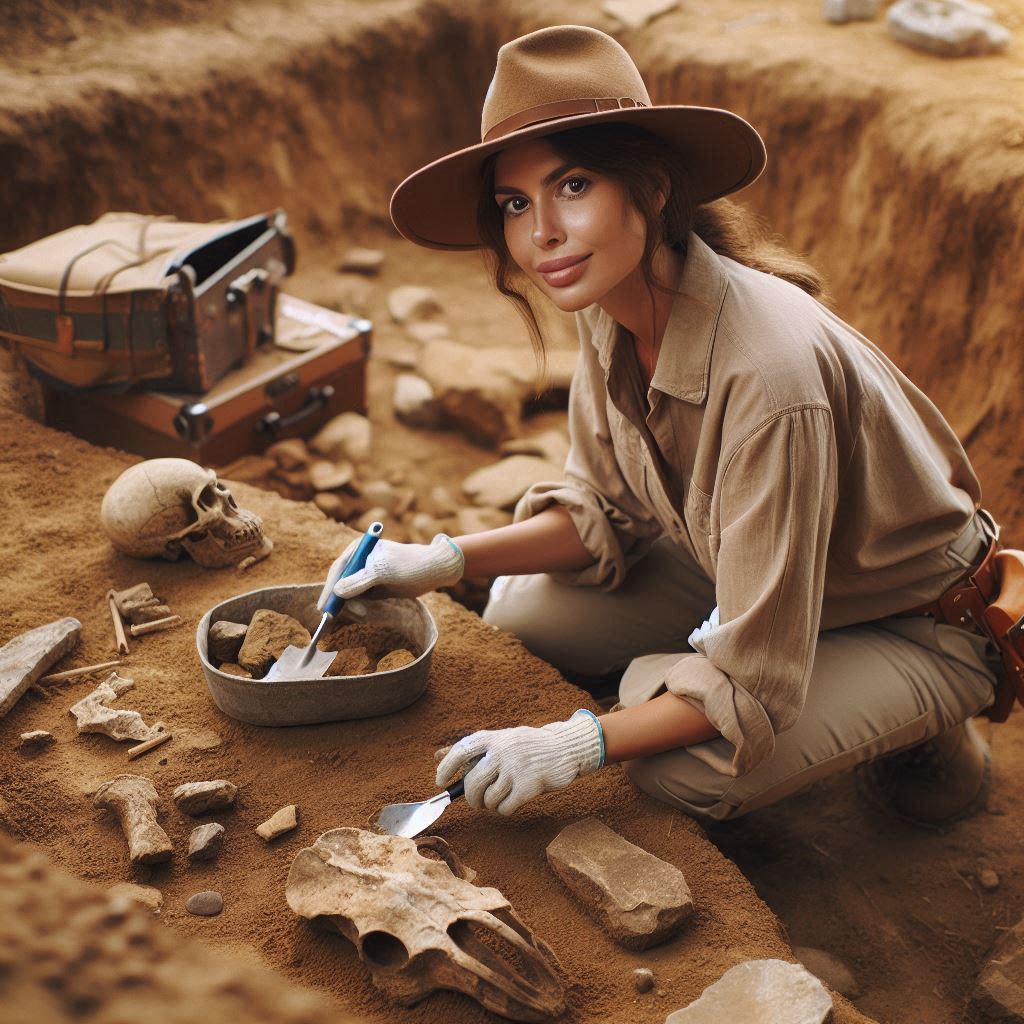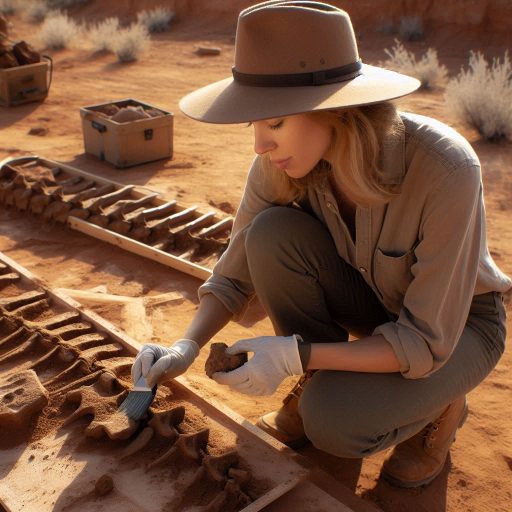Introduction
Archaeology is the study of human history through material remains.
It uncovers artifacts, structures, and cultural landscapes.
By analyzing these remnants, archaeologists gain insights into past societies and their behaviors.
This field plays a crucial role in understanding human development and cultural evolution.
The significance of archaeology extends beyond academia; it informs contemporary society about our shared heritage.
Through archaeological research, we learn about ancient civilizations and their contributions to modern culture.
This knowledge fosters a sense of identity and continuity.
Currently, the demand for archaeologists is growing.
As societies recognize the value of preserving cultural heritage, job opportunities in archaeology are increasing.
Governments, museums, and universities seek professionals skilled in archaeological methods.
This growth highlights the need for specialized education in the field.
Many universities now offer dedicated archaeology programs.
These programs equip students with essential knowledge and skills for archaeological research.
They cover topics such as excavation techniques, artifact analysis, and cultural anthropology.
Specialized education prepares graduates to address the challenges of modern archaeology.
Archaeology is vital for understanding human history.
The rising demand for professionals underscores the importance of targeted education in this field.
Overview of Archaeology Degree Programs
Archaeology degree programs in the United States offer various paths for students interested in the field.
Students can pursue Bachelor’s, Master’s, and Ph.D. degrees.
Each degree program caters to different career goals and levels of expertise.
Types of Degree Programs
A Bachelor‘s degree in archaeology typically provides foundational knowledge in the discipline.
This program introduces students to archaeological methods, theory, and ethics.
Courses often cover topics such as prehistoric archaeology, cultural resource management, and artifact analysis.
For those seeking advanced knowledge, a Master‘s degree in archaeology delves deeper into specialized areas.
This program emphasizes fieldwork and research.
Students may focus on topics like bioarchaeology, historical archaeology, or environmental archaeology.
Many Master’s programs require a thesis based on original research.
Ph.D. programs in archaeology prepare students for academic and research careers.
These programs involve rigorous coursework and extensive research opportunities.
Doctoral candidates must develop a dissertation that contributes new knowledge to the field.
This research often includes fieldwork, laboratory analysis, and interdisciplinary approaches.
Coursework and Research Opportunities
Archaeology degree programs offer diverse coursework that combines theory and practical application.
Students learn various methodologies used in excavations and site analysis.
Classes may include topics like geospatial technologies, conservation methods, and cultural heritage management.
Field schools are an essential part of archaeology education.
They provide hands-on experience in excavation techniques and data collection.
Students learn to apply classroom knowledge in real-world situations, gaining practical skills.
Research opportunities abound within archaeology programs.
Students may participate in ongoing faculty research projects, enhancing their learning experience.
They can also propose independent research topics that align with their interests.
Many programs encourage collaboration with other disciplines.
Students can work alongside anthropologists, historians, and geologists to enrich their research.
Interdisciplinary projects often lead to innovative approaches to archaeological questions.
Internships and volunteer opportunities provide additional practical experience.
Students can work with museums, cultural resource management firms, or archaeological sites.
These experiences enhance their resumes and provide networking opportunities in the field.
Archaeology degree programs in the United States offer various educational paths.
Students can choose from Bachelor‘s, Master‘s, and Ph.D. programs based on their goals.
Coursework combines theory and practical training, preparing graduates for careers in archaeology and related fields.
Read: What Does a Geologist Do? Career Overview and Insights
Top Archaeology Degree Programs in the United States
Several universities in the United States offer exceptional archaeology degree programs.
These institutions provide rigorous coursework, experienced faculty, and extensive research facilities.
They also offer students opportunities for hands-on experience in the field.
Top Universities Known for Strong Archaeology Programs
One of the leading universities for archaeology is Harvard University.
Its Department of Anthropology offers a comprehensive program focusing on various archaeological methodologies and theories.
Harvard emphasizes interdisciplinary studies, integrating archaeology with history, anthropology, and other fields.
The University of Chicago is another prominent institution.
Its Department of Anthropology is renowned for its archaeological research.
Students benefit from access to extensive resources, including the Oriental Institute, which houses significant archaeological collections.
The University of California, Berkeley, also stands out.
Its archaeology program emphasizes fieldwork and offers numerous opportunities for research.
Berkeley provides access to the Hearst Museum of Anthropology, which has a vast collection of artifacts.
New York University (NYU) offers a strong archaeology program through its Department of Anthropology.
NYU focuses on urban archaeology and provides students with unique research opportunities in diverse environments.
The university encourages collaboration with local archaeological projects.
Faculty, Research Facilities, and Hands-On Experience
The faculty at these institutions play a crucial role in student success.
At Harvard, renowned scholars guide students through complex archaeological concepts and methods.
Faculty members conduct extensive research, providing students with insight into ongoing projects.
The University of Chicago’s faculty includes experts in various archaeological specializations.
They actively engage in research and fieldwork, allowing students to participate in cutting-edge studies.
Students can collaborate with faculty on excavations and analyses, enhancing their learning experiences.
Berkeley‘s faculty also excels in diverse archaeological fields.
They encourage students to explore their research interests and guide them in developing independent projects.
Students benefit from the faculty‘s extensive fieldwork experience and academic connections.
NYU’s faculty consists of accomplished archaeologists who focus on urban and historical archaeology.
They involve students in research projects and fieldwork, providing practical experience.
NYU also emphasizes the importance of archaeological ethics, preparing students for professional practices.
Research facilities at these universities are state-of-the-art.
Harvard boasts laboratories equipped for artifact analysis and conservation.
The University of Chicago offers students access to specialized libraries and collections that support archaeological research.
Berkeley‘s Hearst Museum provides resources for artifact preservation and curation.
NYU’s location in New York City allows easy access to numerous archaeological sites and museums, enriching students’ experiences.
Top archaeology degree programs in the United States offer students exceptional opportunities.
With strong faculty, extensive research facilities, and hands-on experiences, these institutions prepare students for successful careers in archaeology.
Read: Educational Path: Becoming a Geologist in the USA
Requirements and Admission Process
Applying to archaeology degree programs involves meeting specific academic requirements and prerequisites.
These criteria vary by university but generally ensure that applicants possess the necessary foundation for advanced studies in archaeology.
General Academic Requirements
Most archaeology degree programs require a high school diploma or equivalent for undergraduate admissions.
Applicants should have a strong academic record, especially in subjects like history, social studies, and sciences.
Many universities prefer students with coursework in geography or anthropology.
For master’s and Ph.D. programs, universities typically expect a bachelor’s degree in archaeology, anthropology, or a related field.
Applicants should maintain a minimum GPA, often around 3.0 or higher on a 4.0 scale.
Some programs may also require standardized test scores, such as the GRE, especially for graduate admissions.
In addition to academic qualifications, universities often seek candidates with research experience.
Involvement in fieldwork or internships demonstrates a commitment to the discipline.
Applicants should highlight any relevant volunteer work or positions that showcase their interest in archaeology.
Specific Prerequisites for Top Universities
Top universities may impose additional criteria for admission into their archaeology programs.
For example, Harvard University requires applicants to submit a personal statement outlining their research interests and career goals.
They also expect applicants to provide letters of recommendation from academic professionals familiar with their work.
The University of Chicago emphasizes the importance of a strong background in archaeological theory and methodology.
Applicants should demonstrate their knowledge of key concepts in their personal statements.
A writing sample showcasing analytical and research skills is often required.
At the University of California, Berkeley, candidates must present a statement of purpose detailing their research interests.
The faculty looks for applicants who align with ongoing research projects.
Additionally, Berkeley values candidates with field experience, so previous excavation or research work is beneficial.
New York University (NYU) seeks students with strong communication skills.
Applicants must submit a writing sample that reflects their analytical abilities.
Letters of recommendation should come from faculty members who can attest to the applicant’s potential for success in archaeology.
In some cases, universities may conduct interviews with prospective students.
This process allows faculty to assess an applicant’s passion and suitability for the program.
It also provides candidates an opportunity to ask questions about the program and faculty.
Aspiring archaeology students must meet general academic requirements while also addressing specific prerequisites set by top universities.
Focusing on academic performance, research experience, and effective communication will strengthen applications.
By thoroughly preparing, students can enhance their chances of gaining admission to their desired archaeology programs.
Read: Botany Career Fairs and Networking Events

Scholarships for Archaeology Degree Programs
Pursuing a degree in archaeology can be costly, but various scholarships and financial aid options are available.
These resources can help ease the financial burden and make education more accessible for aspiring archaeologists.
Scholarship Opportunities for Archaeology Students
Many organizations offer scholarships specifically for students studying archaeology.
These scholarships may target undergraduate and graduate students alike.
For example, the Archaeological Institute of America (AIA) provides multiple scholarships for archaeology students at various academic levels.
These scholarships often focus on fieldwork and research, supporting students with hands-on experiences.
Similarly, the Society for American Archaeology (SAA) offers scholarships to promote diversity in archaeology.
They encourage students from underrepresented backgrounds to apply, fostering inclusivity in the field.
Scholarships typically cover tuition and sometimes additional expenses, such as travel for field studies.
Additionally, universities may have their own scholarship programs for archaeology students.
Many institutions offer merit-based scholarships based on academic performance and research potential.
Students should check with their university‘s financial aid office to explore available options.
Some private foundations also provide scholarships to archaeology students.
For instance, the National Geographic Society awards funding for students pursuing research in archaeology and related fields.
These grants support innovative projects and encourage students to engage in impactful research.
Financial Aid Options, Grants, and Fellowships
In addition to scholarships, students can explore various financial aid options.
Federal and state government programs offer grants and loans to eligible students.
The Free Application for Federal Student Aid (FAFSA) is the first step to accessing these funds.
Many universities also offer their own financial aid programs based on financial need.
Grants are another valuable financial aid option.
Unlike loans, grants do not require repayment.
Organizations like the National Endowment for the Humanities (NEH) offer grants to support archaeological research and education.
These grants can cover tuition and research costs, easing financial strain.
Fellowships provide additional financial support for students pursuing advanced degrees in archaeology.
These programs often include stipends, tuition coverage, and research funding.
The American Council of Learned Societies (ACLS) offers fellowships for graduate students in the humanities, including archaeology.
Many universities also provide graduate assistantships, where students work in exchange for tuition remission and stipends.
These assistantships often involve teaching or conducting research under faculty supervision.
This arrangement allows students to gain valuable experience while funding their education.
Students should actively seek funding opportunities throughout their academic journey.
Researching available scholarships, grants, and fellowships will maximize financial support.
By exploring all options, archaeology students can alleviate financial stress and focus on their studies.
Various scholarships and financial aid options exist for students pursuing archaeology degrees.
By actively seeking out these opportunities, students can significantly reduce their financial burden.
Scholarships, grants, and fellowships all play a crucial role in making archaeology education more accessible.
Read: Preparing for a Botany PhD: Tips and Advice
Career Prospects for Archaeology Graduates
Graduates with a degree in archaeology have diverse career paths available to them.
They can pursue various opportunities in academia, research institutions, museums, and cultural resource management firms.
Each career path offers unique experiences and contributions to the field.
Potential Career Paths for Graduates with a Degree in Archaeology
Many archaeology graduates choose to pursue careers in academia.
They often continue their education by obtaining advanced degrees, such as a master’s or Ph.D.
Graduates can then become university professors or lecturers.
In these roles, they teach courses in archaeology and related subjects.
They also conduct research and publish findings in scholarly journals.
Academia allows graduates to shape future generations of archaeologists and contribute to the discipline‘s knowledge base.
Archaeology graduates can also find employment in research institutions.
These organizations focus on archaeological studies and fieldwork.
Graduates work as researchers, contributing to ongoing projects and investigations.
They often analyze artifacts, document findings, and publish reports.
This work allows graduates to collaborate with other experts in the field.
Research institutions provide valuable opportunities to engage in cutting-edge archaeological research.
Graduates with archaeology degrees frequently pursue careers in museums.
Museums often seek professionals with expertise in archaeology to curate exhibits.
Archaeologists can become curators, managing collections of artifacts and historical items.
They design educational programs and create exhibitions to engage the public.
Additionally, archaeologists in museums may conduct outreach and community engagement activities.
These roles allow graduates to share their passion for archaeology with a wider audience.
Job Opportunities in Academia, Research Institutions, Museums, and Cultural Resource Management Firms
Cultural resource management (CRM) firms also offer promising career paths for archaeology graduates.
These firms assess and manage archaeological sites, ensuring they are preserved.
Graduates work as field archaeologists, conducting surveys and excavations.
They evaluate the significance of sites before development projects.
CRM professionals help balance development needs with cultural heritage preservation.
This field provides hands-on experience and practical applications of archaeological knowledge.
Archaeology graduates may also find opportunities in government and nonprofit organizations.
Many government agencies oversee cultural heritage preservation.
Graduates can work as cultural resource specialists, advising on preservation policies.
Nonprofits often focus on advocacy and education related to archaeology.
Graduates can engage in outreach programs and public education efforts in these roles.
Beyond traditional roles, archaeology graduates can explore careers in technology and consulting.
Some graduates specialize in archaeological informatics, using technology to analyze data.
Others may work as consultants, advising businesses and governments on archaeological matters.
The versatility of an archaeology degree allows graduates to adapt to various job markets.
Archaeology graduates have a wide range of career prospects.
Opportunities in academia, research institutions, museums, and CRM firms provide fulfilling paths.
Each option allows graduates to contribute to the preservation and understanding of cultural heritage.
By pursuing their interests, archaeology graduates can find meaningful and impactful careers in the field.
Transform Your Career Today
Unlock a personalized career strategy that drives real results. Get tailored advice and a roadmap designed just for you.
Start NowInternship and Fieldwork Opportunities
Importance of Gaining Practical Experience
Gaining practical experience through internships and fieldwork is crucial for archaeology students.
These experiences enhance classroom learning and prepare students for future careers.
Internships and fieldwork allow students to apply their knowledge in real-world settings.
This hands-on experience is essential for developing skills and expertise in archaeology.
Internships offer valuable opportunities to work alongside experienced professionals.
Students gain insight into the daily operations of archaeological projects.
They learn about various roles within the field, including research, excavation, and analysis.
Internships help students build professional networks that can lead to future job opportunities.
They also allow students to explore different areas of archaeology and discover their interests.
Fieldwork is a fundamental aspect of archaeological training.
Students participate in excavations, surveys, and site assessments.
This hands-on experience teaches them essential techniques and methodologies.
Working in the field also helps students develop problem-solving and critical-thinking skills.
Additionally, fieldwork exposes students to the challenges of archaeological research in real-world situations.
University Support for Internship and Fieldwork Opportunities
Universities play a vital role in helping students secure internships and fieldwork opportunities.
Many institutions have dedicated career services to assist students in their search.
These services provide resources for finding internship listings and application guidelines.
Universities often host job fairs, connecting students with potential employers in archaeology.
Moreover, universities frequently collaborate with organizations that offer internships.
They maintain relationships with museums, cultural resource management firms, and research institutions.
These connections facilitate internship placements for students, ensuring they receive quality experiences.
Some universities even have their own archaeological field schools.
These programs provide structured fieldwork opportunities while allowing students to earn academic credit.
Faculty members also contribute to students’ internship success.
Professors often have industry connections and can recommend students for positions.
They may also provide guidance on crafting resumes and preparing for interviews.
Faculty involvement helps students feel more confident when applying for internships.
Additionally, universities encourage students to seek fieldwork opportunities abroad.
Many archaeology programs offer study abroad programs focused on archaeological research.
These experiences allow students to work on international projects and gain global perspectives.
Engaging in international fieldwork broadens students’ understanding of diverse cultures and archaeological practices.
Internships and fieldwork are essential for archaeology students.
They provide practical experience, enhance skills, and create networking opportunities.
Universities support students by offering resources, connections, and guidance.
By participating in internships and fieldwork, students prepare themselves for successful careers in archaeology.
See Related Content: Optometry Clinics: Setting Up and Running Your Practice
Discover More: Bioinformatics: Overview of Career Paths and Opportunities
Discover More: Marine Biologist Role in Coral Reef Conservation
Conclusion
Pursuing a degree in archaeology in the United States offers numerous benefits.
Students gain access to high-quality education from top universities.
They learn from experienced faculty members who are experts in the field.
Additionally, students benefit from comprehensive coursework that combines theory and practical skills.
Archaeology programs provide diverse research opportunities, allowing students to explore various cultures and time periods.
Students can engage in hands-on experiences through internships and fieldwork.
These experiences help them develop essential skills while building professional networks.
Moreover, graduates of archaeology programs enjoy diverse career prospects.
They can work in academia, museums, cultural resource management, or research institutions.
The demand for professionals in archaeology continues to grow, offering promising job opportunities.
Aspiring archaeologists should consider the various programs available in the United States.
Each program offers unique strengths, experiences, and specializations.
Exploring different universities allows students to find the best fit for their interests.
Studying archaeology provides valuable knowledge and practical skills.
The diverse opportunities available make it an exciting field to explore.
Aspiring archaeologists should seize these opportunities to advance their careers and contribute to understanding our past.
[E-Books for Sale]
The Big Book of 500 High-Paying Jobs in America: Unlock Your Earning Potential
$19.99 • 500 High-Paying Jobs • 330 pages
Explore 500 high-paying jobs in America and learn how to boost your career, earn more, and achieve success!
See All 500 High-Paying Jobs of this E-Book
1001 Professions Without a Degree: High-Paying American Jobs You Can Start Now
$19.99 • 1001 Professions Without a Degree • 174 pages
Discover 1001 high-paying jobs without a degree! Unlock career tips, skills, and success strategies for just $19.99!




